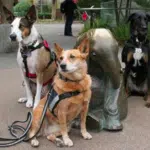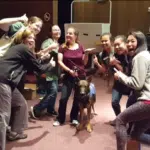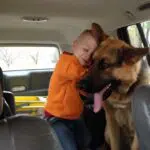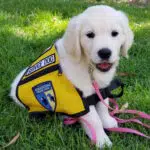Written by Colt Rosensweig
(originally posted December 2, 2015)
When a service dog retires, it’s different from washing out or being career changed.
A dog who retires had, at one point, everything required to be a service dog. A dog who washes out is in one way or another unable to be a service dog.
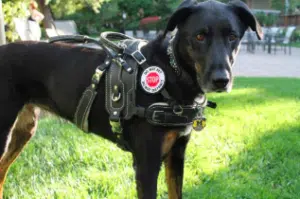
Some dogs have to be retired.
They still want to work, but they are no longer able to do their job safely and comfortably. This happened to my first service dog, Juno. At age five, she was diagnosed with sudden acquired retinal degenerative syndrome (SARDS). This genetic defect causes blindness. Her vision was restored by an experimental treatment for about two years, but then I noticed her vision deteriorating again. She couldn’t navigate as well in the dark and got startled if touched suddenly on the left. Around that time she was also diagnosed with spinal arthritis.
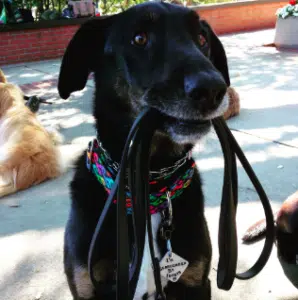
She still wanted to work.
In fact she still wants to work—despite the fact that she’s almost nine now, and completely blind in her left eye. Anytime she knows I’m getting Kaline ready to go, she bounces around us and sometimes hands me her leash.
“Dogs are very stoic and dedicated creatures, Juno especially so. Just because she still wants to work doesn’t mean it’s okay to let her. “
But it’s no longer safe or appropriate for her to work in public.
Her spinal arthritis means that mobility tasks like counterbalance or momentum pull are painful, even if she doesn’t show it. Due to her visual impairment, she can’t help me navigate a crowd or find an exit. She also can’t see surprises coming and would constantly be getting startled. It’s just not right to put her in that position. Dogs are very stoic and dedicated creatures, Juno especially so. Just because she still wants to work doesn’t mean it’s okay to let her. As the person in the partnership, it’s my responsibility to make decisions that are in her long-term best interest, even if those decisions make both me and Juno unhappy in the short-term.
Just because Juno can’t work in public doesn’t mean she can’t help at home.
Helping at home—her favorite tasks have always been retrieving and opening the fridge, both of which she is still very capable of doing—is a big deal for her. She loves it and it makes her feel useful. Also, it gives Kaline a bit of a break, since he isn’t as excited about doing those tasks.
For an owner-trainer like me, it’s much easier when you can retire your service dog gradually. It gives both of you time to get used to the idea, for one. It also gives you time to get used to your up-and-coming partner. Thanks to the experimental treatment, I was able to do this with Juno. I freely admit that there were days when I was just not up to taking the puppy in public and having to deal with being in trainer-mode every minute. On those days, it was wonderful to just put Kaline in his crate and head out with my fully trained girl, who knew exactly what she was supposed to be doing without being told (most of the time). And by the time Juno had to stop working completely, it wasn’t as much of a sudden change for her—or me.
When a service dog retires, there’s always the question of where they will go.
Many handlers keep their retired dogs as pets. When this isn’t possible, the dog is rehomed. Some handlers don’t have the funds or the space to care for a pet dog; some are in situations where they aren’t permitted a pet, even a retired service dog. If the dog came from a program, often she will be offered back to her original puppy raisers. There are also long waiting lists of people waiting to adopt these retired service dogs.
In Juno’s case, she’s in what I like to call joint custody.
Kaline and I have our own apartment, which does not allow pets, so Juno officially lives with my parents. This is a win for everyone (with the possible exception of Kaline, who is filled with unrequited love for his big “sister”).

Juno is still with me nearly all day during the week, since she is my trusty sidekick for walking my packs of dogs.
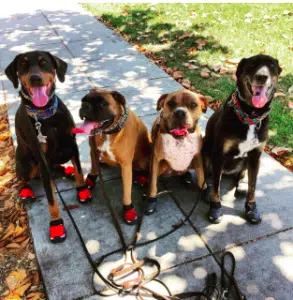
She also comes to my training job with me, unless it’s cold and/or wet. But she also gets a nice break every night from her loving but sometimes very annoying little “brother.”
Juno loves retirement.
When Kaline and I head off for a trip, she gets to go have “spa time” with her Auntie Sonja and her devoted suitor, Sonja’s service dog Chief. Instead of working, she gets to hike off leash and go running on the beach.
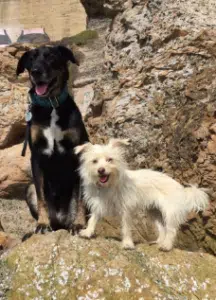
She also clearly enjoys not having to be quite so professional. Juno is still the queen and not interested in paying any attention to strangers who lack food offerings.
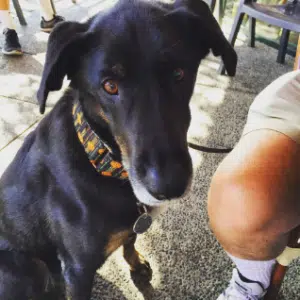
But she loves making sad puppy eyes at all meals (it usually works), and being able to greet her human friends with wounded-bear sounds, kisses, and tail thwacks any time she sees them. After all Juno’s hard work, it’s great to see her getting to enjoy her retirement to the fullest.
